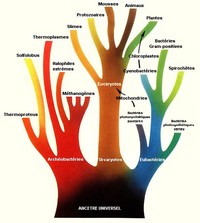 Has Freeman Dyson become an evolution denier?
Has Freeman Dyson become an evolution denier?
Whatever Carl Woese writes, even in a speculative vein, needs to be
taken seriously. In his "New Biology" article, he is postulating a golden
age of pre-Darwinian life, when horizontal gene transfer was universal
and separate species did not yet exist. Life was then a community
of cells of various kinds, sharing their genetic information so that
clever chemical tricks and catalytic processes invented by one creature
could be inherited by all of them. Evolution was a communal affair,
the whole community advancing in metabolic and reproductive efficiency
as the genes of the most efficient cells were shared. Evolution could be
rapid, as new chemical devices could be evolved simultaneously by cells
of different kinds working in parallel and then reassembled in a single
cell by horizontal gene transfer.
But then, one evil day, a cell resembling a primitive bacterium happened
to find itself one jump ahead of its neighbors in efficiency. That cell,
anticipating Bill Gates by three billion years, separated itself from the
community and refused to share. Its offspring became the first species
of bacteria—and the first species of any kind—reserving their
intellectual property for their own private use. With their superior
efficiency, the bacteria continued to prosper and to evolve separately,
while the rest of the community continued its communal life. Some millions
of years later, another cell separated itself from the community and
became the ancestor of the archea. Some time after that, a third cell
separated itself and became the ancestor of the eukaryotes. And so it
went on, until nothing was left of the community and all life was divided
into species. The Darwinian interlude had begun.
—
Our Biotech Future,
By Freeman Dyson,
New York Review of Books,
Volume 54, Number 12 · July 19, 2007
Has he sold out for an admittedly very fetching simile?
Continue reading →

